
Cinema Quarantino is an ongoing series of alternative streaming picks for the self-quarantined and the socially distanced, as selected by the film staff of Boston Hassle. To browse the rest of our picks, click here.
THE FILMS: The Exorcist: The Extended Director’s Cut (1973) dir. William Friedkin / The Omen (1976) dir. Richard Donner
THE STREAMER: Amazon Prime
In these strange times, it’s important to have a little faith that things will go back to normal.
In keeping with the theme of faith, I was hyped when The Brattle Theatre had announced a double feature of The Exorcist: The Extended Director’s Cut and The Omen on March 22, as part of their series A Little Faith Can Be A Dangerous Thing, which was inspired by the upcoming release of A24’s Saint Maud. Unfortunately, with the current pandemic, this was not doable, and the Brattle had to close its doors for the time being.
To honor and celebrate the Brattle (go donate before watching, if you can!) and their brilliant choice of a double feature, let’s take a look at two of the most shocking and well-made films of all time while you’re self-isolating (stay at home and stream!).
Though both these films were made in the ’70s, I’ll warn you anyway—spoilers abound.
The Exorcist and The Omen can, from a faraway standpoint, be seen as very similar movies. That’s understandable. They’re frightening, they both have the subject of religion integrated into the plot in some manner, and both films were created in the golden era of film in the 1970s. Despite the initial similarities that these two films may seem to have, however, they are drastically different.
The Exorcist, based on the novel of the same name by novelist and devout Catholic William Peter Blatty, begins with the adorable yet lonely Regan MacNeil (Linda Blair), who is living with her single mother, Chris (Ellen Burstyn). Shortly after moving to Georgetown, Washington, D.C., Chris notices odd kinks to their home: loud thumps are heard in the attic, scratching appears on the walls, furniture moves, and the air in the home is ice cold.
As time passes, Regan’s behavior and appearance drastically change; she throws violent fits and develops scars and cuts all over her face. Chris worries that her daughter isn’t her daughter anymore. After taking Regan to therapists and doctors and receiving false diagnoses of mental illness, she worries that a demonic entity has overtaken her child. Desperate, she turns to two priests in hopes of saving her daughter.
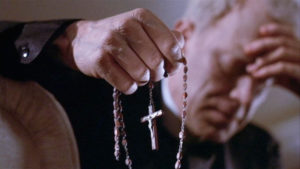
The Exorcist is often marketed and known to be “the scariest film of all time.” Unfortunately, it’s been given a reputation of being “ungodly” and “demonic.” I’ve heard from countless people that they’re afraid to see The Exorcist because they think it’s “too scary” and “too much about the devil.”
It isn’t about the devil.
The title of the film itself is not centered on the devil; an exorcist is “a person who expels or attempts to expel a supposed evil spirit from a person or place.” Even the name The Exorcist focuses on the good.
The film, while at times shocking, is not about horror. Contrary to what most people think, it’s not about Regan. It’s also not about the frail but lion-hearted exorcist that arrives to try and save her, Father Lancaster Merrin (Max von Sydow).
It’s a deeply moving film about faith and redemption and the demise of the devil. It’s a positively religious film that sends the message to viewers: God will prevail over evil.
It’s a film that closely follows Father Damien Karras (playwright Jason Miller), the young, brooding Jesuit who has been asked to assist in the exorcism and has given up on God. He is the solution to the MacNeil family’s problem.
The film’s hero is a priest.
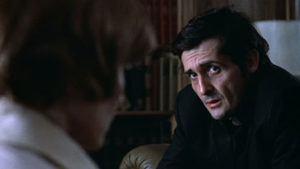
Intertwined with Regan’s slow transition into demonic possession is Karras’s struggle to regain his faith. Once a promising boxer, Karras lives as a miserable priest who drinks too much and looks like he’s got the weight of the world on his shoulders. When his elderly mother dies alone and angry with him, Karras is relentlessly tormented and haunted with grief. His loss of his mother exacerbates his loss of faith; his anger is towards God.
When he is approached by Chris, who begs him to see Regan, Karras dismisses her. He believes that if there is no God, how could there be a devil? At first, he writes off Regan’s possession as a mental illness; he then comes to reason when “help me” is written into her stomach in the middle of the night, seemingly by itself. As Regan disappears and the demon takes full control over her, Father Merrin is called to exorcise her. Karras, who is still hesitant, is asked to assist.

Together, Father Karras and Father Merrin draw the demon out of Regan. When Merrin dies of heart failure mid-exorcism, Karras attacks the demon and makes the ultimate self-sacrifice: he demands the demon relinquish Regan’s innocent soul and come into him. The demon releases Regan and goes into Karras, who commits suicide and throws himself out a bedroom window so that the demon cannot harm anybody else. Karras saving Regan adheres to John 15:13 in the Bible, “Greater love has no one than this, that someone lay down his life for his friends.”
Regan had been treated and seen by doctors, surgeons, specialists, psychiatrists; this has all failed. Who has not failed?
The priests.
The Exorcist ends with happiness and hope. Father Dyer (played by real-life Jesuit William O’Malley), Karras’s friend, visits the MacNeil home to catch them before they leave for Europe to start anew. Regan doesn’t remember anything from her possession, though on their way out the door, she sees Father Dyer’s clerical collar. Confused, she finds herself compelled to kiss his cheek. She knows the collar is a symbol of good and shows her respect and appreciation for what it has done for her. Deep down, she knows that it represents Karras, and the selflessness he exhibited when he sacrificed himself to save her.
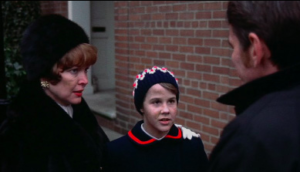
Before Regan and Chris depart, Chris gives Karras’s St. Joseph medal to Dyer. In the ensuing chaos of Regan’s exorcism, the demon had snapped the chain off of Karras’s neck so that it could possess him (further pushing the theory that faith will protect you from evil).
In the original version of The Exorcist released in theaters, Dyer keeps the medal. In the extended director’s cut, he hands it back to Chris so that Karras’s self-sacrifice and his St. Joseph may protect Regan and prevent any other demon from coming back. This version is one that I prefer much more to the theatrical release; it gives a poignant sense of hope, that Regan will live a normal, healthy life because of the love and sacrifice of two priests that gave their lives to save her innocent soul.
The evil is gone, Karras won the battle against the devil, and Regan is free of torment.
The Exorcist is a positive film about faith with a message: God will save you.
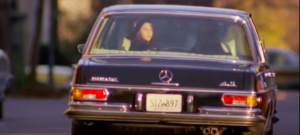

The Omen, however, spins an entirely different narrative: God will not save you.
The 1976 horror flick focuses on the rise of the devil, that evil is unstoppable, and it will always triumph over good, rather than the reverse that is shown in The Exorcist.
Robert and Katherine Thorn (the great Gregory Peck and Lee Remick) are having a baby. Robert, an American diplomat, is taken aside at the hospital and told by priest Father Spiletto that his newborn has died and that he needs to adopt an infant whose mother has recently died in childbirth. Robert adopts the child but doesn’t tell Katherine that the baby isn’t theirs; they name the baby Damien.
As the baby matures into childhood and Robert is promoted as the United States Ambassador of the United Kingdom, the Thorns notice that Damien is not like other children. He is strange, cold, and his parents feel no connection to him. A large dog appears and won’t leave his side, but other animals are horrified of Damien’s presence.
Damien violently reacts to approaching a church, scratching and kicking Katherine and forcing the car to turn around. His nanny hangs herself in front of everyone at his fifth birthday party. Damien smiles at the disturbing scene.

A priest named Father Brennan (Patrick Troughton) warns Robert, claiming that Damien is inhuman and has sinister origins. After Robert agrees to meet with him to discuss things further, Brennan is impaled by a rod that falls from the top of a cathedral during a freak lightning storm.
Photographer Keith Jennings (David Warner) notices marks in photographs of both Damien’s nanny and Father Brennan that foretold their deaths before they happened. When Jennings photographs himself, he sees the same mark across his neck. He too goes to Robert and tells him that Damien is evil and must be stopped. Meanwhile, Damien causes Katherine to fall off an upstairs railing, putting her into the hospital. She is soon killed by Damien’s new nanny, Mrs. Baylock.
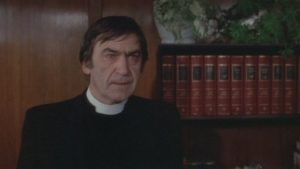
Keith and Robert head to a monastery to track down Father Spiletto, the priest who had urged Robert to adopt Damien at birth. He directs them to an abandoned cemetery, where they find Damien’s true birth mother: a jackal, with the grave of Robert’s actual son beside it. At birth, Robert and Katherine’s true son was murdered so that Damien could replace him.
After a visit with an archaeologist, Robert learns that his adoptive son is the Antichrist and is instructed to kill Damien in a church using a ceremonial dagger. Keith is beheaded retrieving the daggers when, in a fit of disgust, Robert throws the daggers into a construction site.

Robert returns to London to find that Damien has the tell-tale birthmark of the Antichrist, shaped with three sixes. In a panic, he kidnaps an enraged Damien, kills the psychotic Mrs. Baylock, and drives to the cathedral in which Damien had previously resisted. Robert places his adoptive son on the altar, asking God to forgive him as he plunges the ceremonial dagger down to kill Damien. Before he can succeed, police burst into the church, shooting Robert to death and saving Damien.
A joint funeral is held for Katherine and Robert’s bizarre deaths. Damien stands at the service with the President of the United States, smiling, indicating that he will strategize and begin to move higher and higher in power.
The Omen illustrates how the devil will prevail and win, no matter how much good or faith stands in his way. All those who were good, religiously affiliated, or made an attempt to stop Damien were brutally killed—Robert, Katherine, Father Brennan, and Keith.
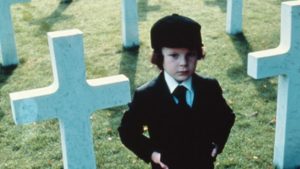
Contrary to The Exorcist, The Omen is a hopeless film that leaves no warmth in your bones after you watch; it leaves no lingering sense of happiness or ease. Damien has triumphed over good, and he has brutally wiped out the powers of God, smiling while doing so.
There are instances in the film where holy symbolism, such as churches and clergy, are viewed as sinister: Father Brennan was violently impaled by the cathedral, Robert was shot to death in a cathedral while trying to end the second coming of Satan, and Father Spiletto tricked Robert into taking on the Antichrist. Even the good in this film can be viewed as “the bad.” In The Exorcist, the priest prevails. In The Omen, the Anitchrist prevails.
The Exorcist and The Omen may often be viewed as films that go hand-in-hand, but they aren’t. One is a brilliant and emotional film rich in faith, while the other is a chaotic yet fantastic horror movie that shakes you to your bones.
Catch them both streaming now on Amazon Prime, and support The Brattle Theatre for picking such top-notch flicks for a double feature!
The Exorcist: The Extended Director’s Cut
1973
dir. William Friedkin
132 min.
The Omen
1976
dir. Richard Donner
111 min.
Both films currently streaming on Amazon Prime
Streaming is no substitute for taking in a screening at a locally owned cinema, and right now Boston’s most beloved theaters need your help to survive. If you have the means, the Hassle strongly recommends making a donation, purchasing a gift card, or becoming a member at the Brattle Theatre, Coolidge Corner Theatre, and/or the Somerville Theatre. Keep film alive, y’all.

